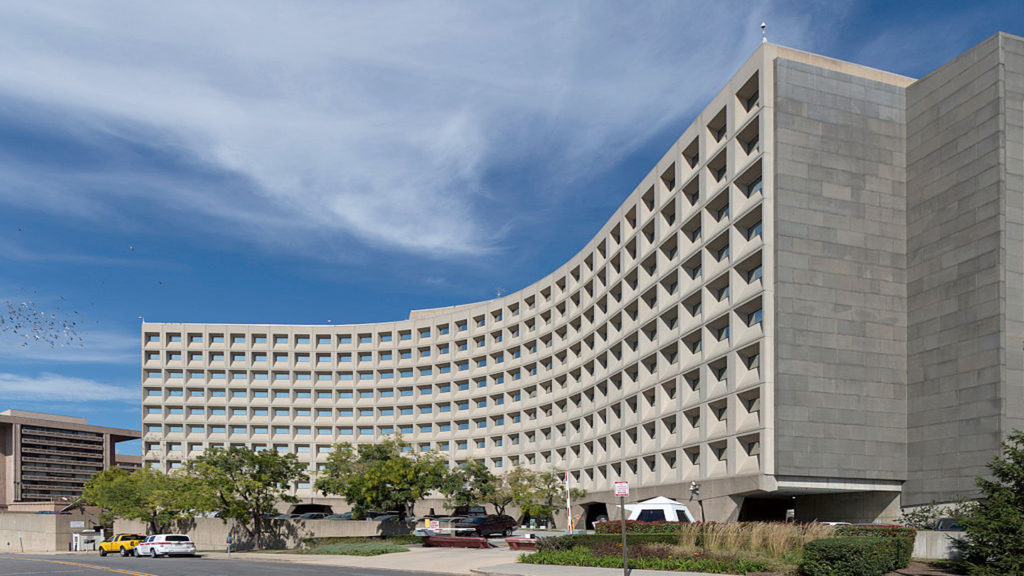
The federal affordable senior housing program would receive a 21% increase in funding over last year if the $1.5 trillion fiscal year 2022 appropriations bill, released Wednesday, passes and is signed by President Biden as written.
The FY22 omnibus bill — which began Oct. 1, 2021 — also includes the largest funding for new Department of Housing and Urban Development’s Section 202 Supportive Housing for the Eldelry homes since fiscal year 2010.
Other aging services priorities included in the appropriations bill are funding and improvement for participation of Section 202 Project Rental Assistance Contracts, or PRACs, in HUD’s Rental Assistance Demonstration, or RAD, program; full renewal and funding for existing Section 202 PRACs; funding for existing grant-funded service coordinators; and help to address the gap in broadband access among HUD-assisted households.
LeadingAge President and CEO Katie Smith Sloan said she was “thrilled to see Congress acknowledge and address the pressing needs of older adults and their families, specifically in housing and access to healthcare.”
“This bill is a tremendous win for older adults,” she said. “More affordable housing for low-income seniors cannot come soon enough.”
Wednesday afternoon, House Speaker Nancy Pelosi (D-CA) announced that Democrats pulled billions of dollars in emergency COVID-19 relief funding from the omnibus bill. The bill proposed offsetting the new COVID spending by clawing back money already sent to states as part of the $1.9 trillion American Rescue Plan Act signed by President Biden a year ago.
Argentum President and CEO James Balda told McKnight’s Senior Living that while funding for Section 202 housing and the extension of telehealth waivers are two positives in the legislation, he was disappointed that no further funds would be devoted to the Provider Relief Fund.
“We find it unconscionable that Congress has acted to strip COVID-19 relief from the omnibus funding package, removing the chance for senior living caregivers who have been on the frontlines fighting the pandemic for two-plus years to recover some of the $30 billion in financial losses they have incurred,” Balda said. “Time and again, Congress has found a way to ignore the two million residents who call assisted living and dementia care home, and they have done so again.”
Balda reiterated Argentum’s call for a new COVID relief package, with targeted funds for senior living, and additional measures including workforce programming to help stem a “historic staffing crisis shortage in our communities.” Argentum supports passage of the Safeguarding Elderly Needs for Infrastructure and Occupational Resources (SENIOR) Act, which would include a $10 billion sustainability fund similar to the Provider Relief Fund and would establish $1.25 billion in federal grants for workforce development.
The appropriations bill, which passed the House, is expected to move quickly through the Senate and be signed into law by the president before the end of the current continuing resolution, March 11.
Section 202 appropriations
Overall, the omnibus bill would provide more than $1 billion for the Section 202 program, a funding increase of $178 million compared with FY21 funding.
Included in the Section 202 funding is $199 million for new Section 202 homes, which could result in 2,200 new homes, helped by the operating subsidy provided by PRACs, according to LeadingAge.
The aging services association said that this is the largest annual funding for new Section 202 homes since fiscal year 2010, before funding for new homes went dormant for several years. The expansion of affordable senior housing is the association’s top housing policy priority.
PRAC and Senior Preservation Rental Assistance Contract, or SPRAC, renewals also are included under the Section 202 account funding. After fully renewing those PRAC and SPRAC contracts, the remaining funds can be used for other purposes, including new Section 202 homes and service coordinators.
Another $6 million in the Section 202 account would be directed toward RAD housing preservation improvements. This program would help many Section 202 PRACs and preserve those affordable senior homes into the future.
Service coordinator funding
The $125 million included for service coordinators would renew all existing contracts. The HUD and House requests included additional service coordinators.
LeadingAge said it is unclear whether the $125 million could be used to expand the number of affordable housing service coordinators — as requested by HUD and the House version of the appropriations bill — or augment salaries of existing service coordinators, which was included in the Senate version. In a Jan. 27 letter to Appropriations Committee members, LeadingAge pointed out that of all Section 202 communities, only 45% have service coordinators. LeadingAge said that the use of service coordinators lowers hospital use, increases higher value healthcare use, leads to success reaching high-risk populations and results in fewer nursing home transfers.
HUD’s $30 million request to support budget-based rent increases at Section 202 and Section 8 properties — also included in the House version of the bill — was not included in the omnibus bill. That additional funding, LeadingAge said, would have covered the cost of a service coordinator to help older adult residents stay healthy and age in place.
Broadband access
The legislation would encourage addressing the gap in broadband access among HUD-assisted households. The bill specifically mentions improving broadband connectivity, providing technical assistance to HUD grantees and considering the needs of specific populations, including older adults and residents with disabilities.
The appropriations bill also directs HUD’s Office of Policy Development & Research to analyze barriers to broadband access and provide subsidized broadband to HUD-assisted households.
Home modification grants
The omnibus bill also would provide $15 million in “aging-in-place home modification grants” for low-income older adult homeowners. The program does not currently include low-income older adults renters, but nonprofit organizations are eligible for the program.




